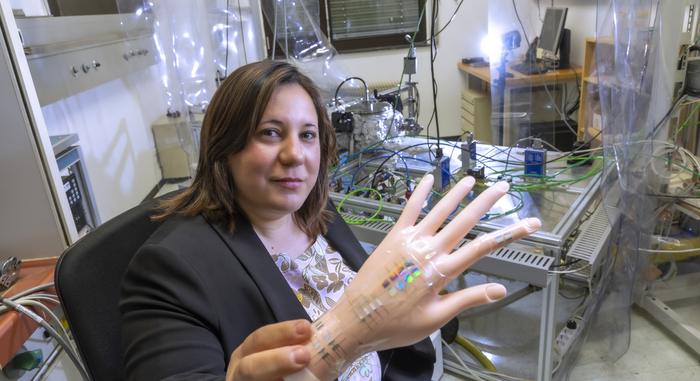Just a few months ago, Anna Maria Coclite and her team from the Institute of Solid State Physics at Graz University of Technology (TU Graz) presented the results of their research as part of Coclite’s ERC Starting Grant project “SmartCore”. They had succeeded in developing the three-in-one “smart skin” hybrid material, which closely resembles human skin by simultaneously sensing pressure, moisture and temperature and converting them into electronic signals. With 2,000 individual sensors per square millimetre, the hybrid material is more sensitive than a human fingertip and, at 0.006 millimetres thick, many times thinner than human skin. By reacting to the three aforementioned human sensory impressions, the smart skin surpasses all electronic skin materials on the market to date which only react to pressure and temperature.

Credit: Lunghammer – TU Graz
Just a few months ago, Anna Maria Coclite and her team from the Institute of Solid State Physics at Graz University of Technology (TU Graz) presented the results of their research as part of Coclite’s ERC Starting Grant project “SmartCore”. They had succeeded in developing the three-in-one “smart skin” hybrid material, which closely resembles human skin by simultaneously sensing pressure, moisture and temperature and converting them into electronic signals. With 2,000 individual sensors per square millimetre, the hybrid material is more sensitive than a human fingertip and, at 0.006 millimetres thick, many times thinner than human skin. By reacting to the three aforementioned human sensory impressions, the smart skin surpasses all electronic skin materials on the market to date which only react to pressure and temperature.
On the way to commercialisation
European Research Council (ERC) Proof of Concept (PoC) Grants support researchers who have already secured an ERC grant and who now want to test their research results for marketable innovation potential. Starting from the existing prototype of the smart skin, the scientist wants to use the PoC funding to develop the wireless connection of the electronic skin to a real-time monitoring system. This is to transmit important data on temperature, humidity and pressure via Bluetooth to a smartphone app that can be used to display the recorded sensory impressions. This represents a central further development of the currently still unwieldy wired electrical readout of the data and is an important step towards making the smart skin advantages presentable to potential customers. Industrial partners, including robot manufacturers, prosthetics companies and medical device producers, are to be involved in the further development of the smart skin at an early stage so that their requirements can be taken into account accordingly.
“We can take an important step towards a market launch of the smart skin with this EU funding. It will be exciting to see how the results of our basic research can find concrete application in monitoring, in the health sector or in robotics,” says Anna Maria Coclite, who is delighted about the PoC grant.
Potential areas of application for the smart skin
There are many commercial applications for the multisensory hybrid material developed at TU Graz and the market is very big worldwide. According to the World Health Organisation (WHO), around 200,000 people are severely burned every year and suffer a complete loss of sensation due to the death of the skin receptors. Smart skin could act as a “plaster” to help burn victims regain their sensations. It could also revolutionise the manufacture of intelligent prostheses. Modern prostheses reproduce movements and are – if possible – connected to the nerve endings so that patients can control and move the robotic limb using their brain. Smart skin could cover the prostheses and collect sensory information. According to a WHO estimate, around 30 million people worldwide need a prosthesis. In general, broad application possibilities are opening up in the medical device sector. Used as a sensor with smart watches, the novel multisensory hybrid material collects precise information about the health status of patients. In this way, skin moisture, pH value and temperature could be continuously monitored. It is a very big market, with about 216 million people wearing a smart watch in 2022.
First Proof of Concept Grant for TU Graz
While Anna Maria Coclite was the first woman to receive an ERC grant at TU Graz in 2016, she is now the first researcher ever to win an ERC Proof of Concept grant at TU Graz. PoC grants from the European Research Council are endowed with 150,000 euros for a maximum of 18 months. The research company Joanneum Research, which holds the patent for smart skin together with TU Graz, remains an important research partner in the proof of concept project.




